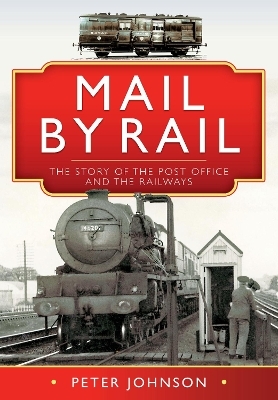
Mail by Rail - The Story of the Post Office and the Railways
Seiten
2022
Pen & Sword Transport (Verlag)
978-1-5267-7613-6 (ISBN)
Pen & Sword Transport (Verlag)
978-1-5267-7613-6 (ISBN)
Biographies of key personalities and accident victims.
Railways have been used for the carriage of mail since soon after the Liverpool & Manchester Railway opened in 1830, the development of the first travelling post offices following, enabling the Post Office to achieve maximum efficiencies in mail transportation. As the rail network grew the mail network grew with it, reaching a peak with the dedicated mail trains that ran between London and Aberdeen.
The Post Office also turned to railways when it sought a solution to the London traffic that hindered its operations in the Capital, obtaining powers to build its own narrow gauge, automatic underground railway under the streets to connect railway stations and sorting offices. Although construction and completion were delayed by the First World War, the Post Office (London) Railway was eventually brought into use and was an essential part of Post Office operations for many years.
Changing circumstances brought an end to both the travelling post offices and the underground railway but mail is still carried, in bulk, by train and a part of the railway has found a new life as the Mail Rail tourist attraction.
Author Peter Johnson has delved into the archives and old newspapers to uncover the inside story of the Post Office and its use of railways to carry the mail for nearly 200 years.
Railways have been used for the carriage of mail since soon after the Liverpool & Manchester Railway opened in 1830, the development of the first travelling post offices following, enabling the Post Office to achieve maximum efficiencies in mail transportation. As the rail network grew the mail network grew with it, reaching a peak with the dedicated mail trains that ran between London and Aberdeen.
The Post Office also turned to railways when it sought a solution to the London traffic that hindered its operations in the Capital, obtaining powers to build its own narrow gauge, automatic underground railway under the streets to connect railway stations and sorting offices. Although construction and completion were delayed by the First World War, the Post Office (London) Railway was eventually brought into use and was an essential part of Post Office operations for many years.
Changing circumstances brought an end to both the travelling post offices and the underground railway but mail is still carried, in bulk, by train and a part of the railway has found a new life as the Mail Rail tourist attraction.
Author Peter Johnson has delved into the archives and old newspapers to uncover the inside story of the Post Office and its use of railways to carry the mail for nearly 200 years.
Best known for his books on narrow gauge and Welsh railways, Peter Johnson first wrote about travelling post offices in 1985 and added the Post Office (London) Railway to his portfolio in 1995. Living in Leicester, he was employed in local authority fire service communications for 29 years. This is his eighth book for Pen & Sword Transport.
| Erscheinungsdatum | 01.12.2022 |
|---|---|
| Zusatzinfo | 200 colour & black and white illustrations & maps |
| Verlagsort | Barnsley |
| Sprache | englisch |
| Maße | 172 x 246 mm |
| Themenwelt | Natur / Technik ► Fahrzeuge / Flugzeuge / Schiffe ► Schienenfahrzeuge |
| ISBN-10 | 1-5267-7613-8 / 1526776138 |
| ISBN-13 | 978-1-5267-7613-6 / 9781526776136 |
| Zustand | Neuware |
| Informationen gemäß Produktsicherheitsverordnung (GPSR) | |
| Haben Sie eine Frage zum Produkt? |
Mehr entdecken
aus dem Bereich
aus dem Bereich
Das Beste aus Stadt und Land.
Buch | Softcover (2024)
VUD Medien (Verlag)
CHF 16,80
Buch | Softcover (2024)
hidden europe publications (Verlag)
CHF 36,65
die visuelle Chronik der Schienenfahrzeuge
Buch | Hardcover (2024)
DK Verlag Dorling Kindersley
CHF 48,90


